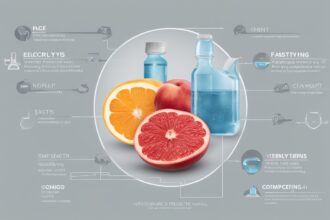Fasting, whether for religious, health, or personal reasons, is a practice that challenges the body’s natural rhythms. One of the most critical aspects to monitor during fasting is hydration. Without proper fluid and electrolyte balance, fasting can lead to fatigue, headaches, and even serious health complications. In this post, we’ll explore the importance of balancing hydration during fasting, focusing on how electrolytes play a pivotal role in maintaining your well-being throughout the process.
The Importance of Hydration During Fasting
When you fast, your body is deprived of regular food and, in some cases, water intake. Even in fasting methods that allow water, such as intermittent fasting, the absence of food can disrupt the balance of electrolytes like sodium, potassium, and magnesium, which are essential for hydration. Dehydration during fasting can cause symptoms like dizziness, irritability, and muscle cramps. Staying hydrated isn’t just about drinking water; it’s about ensuring your body retains the right balance of fluids and minerals to function optimally.
Electrolytes are charged minerals that help regulate nerve and muscle function, maintain pH levels, and keep you hydrated. Without them, water alone cannot effectively replenish what your body loses through sweat, urine, and other processes. This is why balancing hydration during fasting requires a strategic approach to both fluid intake and electrolyte management.
How Fasting Impacts Electrolyte Balance
Fasting, especially prolonged or water-only fasts, can significantly impact your electrolyte levels. When you abstain from food, your body may deplete its stores of sodium and potassium as it burns through glycogen (stored energy in the liver and muscles). This process releases water and electrolytes, which are then excreted through urine. Without replenishment, this can lead to an imbalance, causing symptoms like fatigue, headaches, or even heart palpitations in severe cases.
Additionally, fasting can lower insulin levels, which prompts the kidneys to excrete more sodium. This is why individuals practicing extended fasts or ketogenic diets (often paired with fasting) may experience the “keto flu,” a set of symptoms caused by electrolyte imbalances. Understanding how fasting affects your body is the first step to maintaining proper hydration and preventing these issues. For more on how electrolytes function in the body, check out our detailed guide on Electrolyte Basics.
Strategies for Balancing Hydration During Fasting
Balancing hydration during fasting doesn’t have to be complicated, but it does require intentional planning. Here are some practical strategies to ensure you maintain proper fluid and electrolyte levels:
- Drink Water Regularly (When Allowed): If your fasting protocol permits water, sip it consistently during non-fasting windows or throughout the day. Aim for at least 8–10 cups (about 2–2.5 liters) of water, adjusting based on activity level and climate.
- Incorporate Electrolyte-Rich Fluids: Plain water lacks the minerals needed to restore balance. During eating windows or pre-fast meals, include broths, coconut water, or electrolyte-enhanced drinks to replenish sodium, potassium, and magnesium.
- Monitor Your Symptoms: Pay attention to signs of dehydration or electrolyte imbalance, such as dry mouth, lethargy, or muscle cramps. These are cues to adjust your intake.
- Avoid Overhydration: Drinking excessive water without electrolytes can dilute the minerals in your blood, leading to a condition called hyponatremia. Balance is key.
For additional tips on hydration strategies, explore our post on Hydration Hacks for Active Lifestyles.
Best Sources of Electrolytes During Fasting
While fasting limits food intake, there are still ways to ensure you’re getting enough electrolytes, especially during eating windows or in preparation for a fast. Here are some of the best sources to consider:
- Bone Broth: Rich in sodium and other minerals, bone broth is an excellent choice for breaking a fast or consuming during modified fasting protocols.
- Coconut Water: A natural source of potassium and magnesium, coconut water is a hydrating option for rebalancing electrolytes.
- Electrolyte Powders or Tablets: These are convenient for adding to water during non-fasting periods. Look for products without added sugars or artificial ingredients.
- Leafy Greens and Avocados: If your fast includes light meals, prioritize foods high in potassium and magnesium, such as spinach, kale, and avocados.
Choosing the right sources can make a significant difference in how you feel during a fast. Learn more about natural electrolyte sources in our article on Top Foods for Electrolyte Balance.
Common Mistakes to Avoid When Hydrating During Fasting
While focusing on balancing hydration during fasting, it’s easy to make mistakes that can undermine your efforts. Here are some pitfalls to watch out for:
- Relying Solely on Water: As mentioned earlier, water alone isn’t enough to maintain electrolyte balance. Without minerals, your body struggles to retain fluids effectively.
- Ignoring Individual Needs: Hydration needs vary based on factors like age, weight, activity level, and climate. A one-size-fits-all approach won’t work.
- Overloading on Electrolytes: Too much sodium or potassium can be just as harmful as too little. Stick to recommended amounts and consult a healthcare provider if unsure.
Avoiding these mistakes can help you maintain optimal hydration and energy levels. For a deeper dive into hydration myths, read our post on Debunking Hydration Myths.
When to Seek Professional Guidance
While most people can manage hydration and electrolyte balance with simple strategies, certain situations call for professional advice. If you’re new to fasting, have pre-existing medical conditions (like kidney disease or diabetes), or experience severe symptoms like confusion, rapid heartbeat, or extreme fatigue, consult a healthcare provider or nutritionist. They can help tailor a fasting plan that includes safe hydration practices and electrolyte monitoring.
Additionally, if you’re engaging in extended fasts (beyond 24–48 hours), it’s wise to work with a professional to ensure your body is supported. For more information on fasting safely, check out our guide on Safe Fasting Practices for Beginners.
Disclaimer: The information provided in this article is for educational purposes only and is not intended as medical advice. Fasting and hydration practices can vary widely based on individual health conditions and needs. Always consult with a healthcare professional or qualified nutritionist before starting any fasting regimen or making significant changes to your diet or hydration routine. We are not responsible for any adverse effects resulting from the application of the information provided in this post.
References
- Mayo Clinic: Water: How Much Should You Drink Every Day?
- Harvard Health: The Importance of Staying Hydrated
- NCBI: Electrolyte Imbalances and Fasting – A Review
- WebMD: Electrolytes and Your Health
- American Heart Association: Sodium and Salt
This content is for informational purposes only and not a substitute for professional advice.






